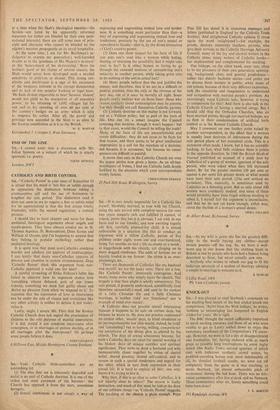Stu,—It is very nearly impossible fora Catholic like myself, blissfully
married, at case with my Church, using the safe period with complete success for over two years, sexually rich and fulfilled (1 cannot, of course, prove this but it is obvious, I am told, in our faces and to our friends), and now awaiting eagerly our first, carefully planned-for child; it is almost unbearable in a situation like this to conduct an argument with a fellow Catholic, parent of five children under eight, worn out and over-burdened, living 'for months on end a life as chaste as a monk', at loggerheads with • his church, yet clinging on in sheer dogged obedience. The odds of fortune are so heavily loaded in my favour : the virtue is so over- whelmingly his.
There arc thousands of Catholics like my husband and myself; we are the lucky ones. There are a few, like 'Catholic Parent', immensely courageous. Ahd many, many more who simply leave the church. The tragedy is that their plight is wholly unnecessary. The safe period, if properly understood, scientifically (and therefore successfully) used, and seen' in the context of a fully Christian life and a fully Christian marriage, is neither 'cold' nor 'functional' nor 'a triumph of mind over matter'.
A Catholic does not practise sexual intercourse because it happens to be' safe on certain days, but because he wants to. He does not practise continence- on certain other, 'unsafe' days, in blind obedience to an incomprehensible law (this would, indeed, be 'cold' and 'calculating') but in loving, willing, comprehend- ing acceptance of the divine plan as uttered by his church. The days of sexual abstinence become, for such a Catholic, days set apart for special worship of his Maker, days of unique sacrifice and spiritual significance. They serve to draw a husband and wife immeasurably closer together by virtue of shared belief, shared practice, shared self-control; and to arouse in each a special tenderness and regard for the other, which in turn finds expression in their sexual life. It is hard to explain all this: one only learns it by trying to live it. is i
Why then, if this is so clear to some Catholics, s t not equally clear to others? The reason is faulty instruction, and much of this must be laid at the door of our celibate clergy—as 'Catholic Parent' suggests. The teaching of the church is plain enough. Pope Pius XII has stated it in numerous messages and letters (published in England by the Catholic Truth Society). And enlightened Catholic opinion (I stress again the word 'enlightened)--for example, the priests, doctors, university teachers, parents, who give their services to the Catholic Marriage Advisory Council; many of the lay and clerical writers in the Catholic press; many writers of Catholic books— has implemented and complemented his teaching.
Our bishops, on the other hand, seem very often to be the prisoners of their own generation, upbring- ing, background, class, and general prudishness— rather like elderly bachelor uncles—and prefer not to discuss these matters in public; while many of our priests, because of their very different experience, lack the sensitivity and imagination to understand and sympathise with married people's problem. An increasingly vocal Catholic laity, however, is trying to compensate for this! And there is also talk in the Catholic Church of having a married clergy. But I should add that the Orthodox. Churches, who do have married priests, though not married bishops, are as firm in their condemnation of artificial birth control as is the Roman Catholic Church.
May 1 comment on one further point raised by another correspondent, to the effect that a woman is usually least desirous of intercourse during the safe period phase of her menstrual cycle. This is a statement often made, I know, but it has no scientific backing. In fact, what little evidence there is points in the opposite direction. In 1960 the British Medical Journal published an account of a study (not by Catholics) of a group of women, ignorant of the safe period, who were asked when they felt increased desire. By far the greater number (59 per cent as against 6 per cent) felt greater desire at what would have been their safe period. (The rest noticed no variation). This, naturally, is sometimes used by Catholics as a debating point. But as only about 100 women were eventually studied, and some of these would probably have been frigid without wanting to admit it, I myself feel the argument is inconclusive, and that we do not yet know enough, either way, about the rhythm of a woman's sexual desire.
49 Albert Road, Richmond, Surrey
ERIKA FALLAUX






































 Previous page
Previous page